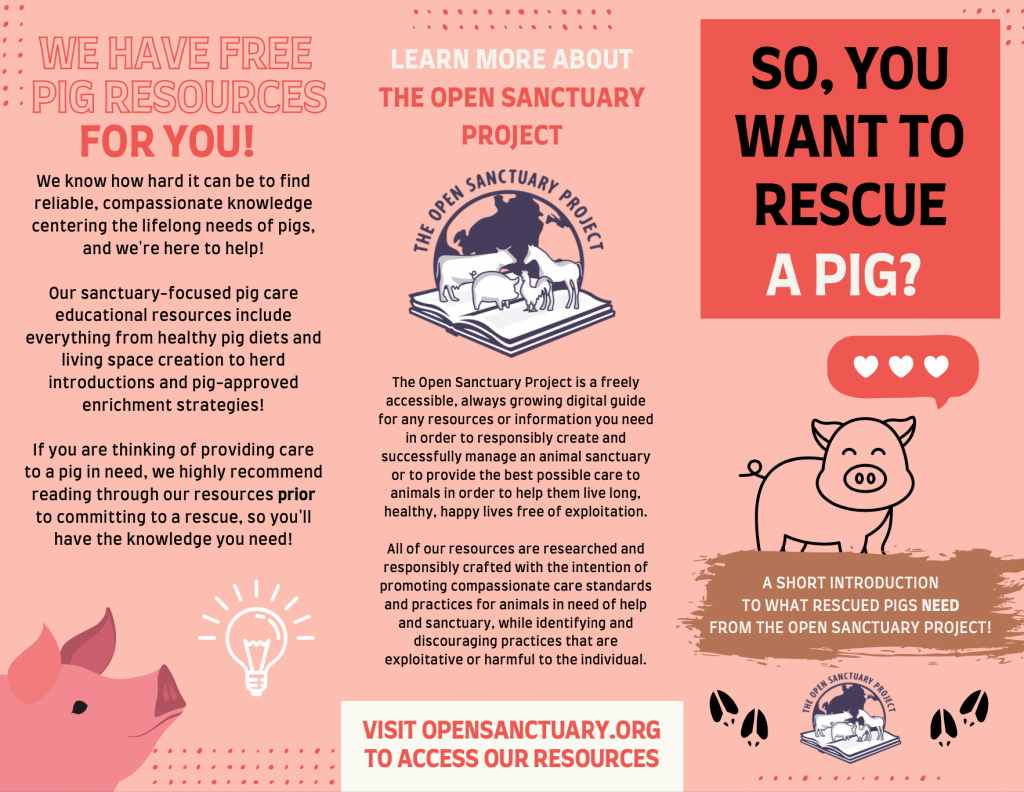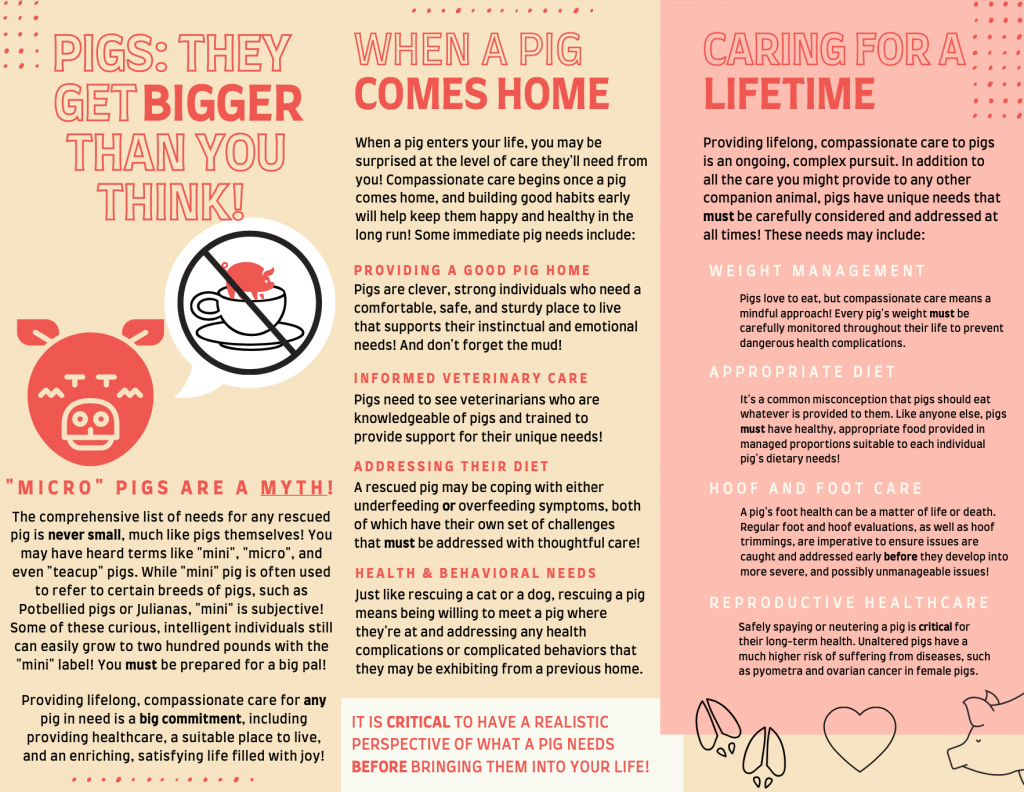

Enter either your organization’s name or your name and email below to download a free brochure PDF that you can have printed out for visitors to your organization who are interested in learning more about what it takes to provide lifelong compassionate care for pigs. Physical literature is a great way to relay a lot of information in a pleasing way to curious individuals.
Looking For More Info On This Subject?
For more information on what to consider when thinking about providing lifelong care for pigs, check out our introductory resource about what pigs need here!
A4 Formatted Version Of This Brochure
Edgar’s Mission created an A4 version of this brochure! If your organization operates outside of the United States, you can download a printable A4 version with the following form:
We promise not to use your email for any marketing purposes! Would you prefer to access this form in a different way? Contact us and let us know!
How’s This Literature Working For You?
Have you used this brochure at your sanctuary and want to give us your feedback on improvements? Let us know here!
Full Text Summary Of The Brochure:
Here’s The Open Sanctuary Project’s “So You Want To Rescue A Pig” text summary:
Panel 1: “So you want to rescue a pig? A short introduction to what rescued pigs need from The Open Sanctuary Project!”
Panel 2: “Pigs: They get bigger than you think!-
“Micro” pigs are a myth! The comprehensive list of needs for any rescued pig is never small, much like pigs themselves! You may have heard terms like “mini”, “micro”, and even “teacup” pigs. While “mini” pigThe term “mini pig” is used to categorize smaller breeds of pigs, such as Potbellies, Julianas, and Kunekunes, and to differentiate between these breeds and large breed pigs, such as Yorkshires, Landrace, or Hampshires, who are sometimes referred to as “farm pigs”. The descriptor “mini” can be a bit misleading- some breeds of mini pigs can weigh over 200 pounds! Terms like “teacup”, “micro”, “pocket”, “nano”, and “micro mini” are deceptive terms that are sometimes used to intentionally mislead people into thinking an individual pig will remain a certain size. is often used to refer to certain breeds of pigs, such as Potbellied pigs or Julianas, “mini” is subjective! Some of these curious, intelligent individuals still can easily grow to two hundred pounds with the “mini” label! You must be prepared for a big pal! Providing lifelong, compassionate care for any pig in need is a big commitment, including providing healthcare, a suitable place to live, and an enriching, satisfying life filled with joy!”
Panel 3: “When A Pig Comes Home:
When a pig enters your life, you may be surprised at the level of care they’ll need from you! Compassionate care begins once a pig comes home, and building good habits early will help keep them happy and healthy in the long run! Some immediate pig needs include:
Providing a good pig home – Pigs are clever, strong individuals who need a comfortable, safe, and sturdy place to live that supports their instinctual and emotional needs! And don’t forget the mud!
Informed veterinary care – Pigs need to see veterinarians who are knowledgeable of pigs and trained to provide support for their unique needs!
Addressing their diet – A rescued pig may be coping with either underfeeding or overfeeding symptoms, both of which have their own set of challenges that must be addressed with thoughtful care!
Health & behavioral needs – Just like rescuing a cat or a dog, rescuing a pig means being willing to meet a pig where they’re at and addressing any health complications or complicated behaviors that they may be exhibiting from a previous home.
It is critical to have a realistic perspective of what a pig needs before bringing THEM into your life!”
Panel 4: “Caring for a lifetime-
Providing lifelong, compassionate care to pigs is an ongoing, complex pursuit. In addition to all the care you might provide to any other companion animalAn animal who spends regular time with humans in their home and life. Typically cats and dogs are considered companion animals, though many species of animals could also be companion animals., pigs have unique needs that must be carefully considered and addressed at all times! These needs may include:
Weight management – Pigs love to eat, but compassionate care means a mindful approach! Every pig’s weight must be carefully monitored throughout their life to prevent dangerous health complications.
Appropriate diet – It’s a common misconception that pigs should eat whatever is provided to them. Like anyone else, pigs must have healthy, appropriate food provided in managed proportions suitable to each individual pig’s dietary needs!
Hoof and foot care – A pig’s foot health can be a matter of life or death. Regular foot and hoof evaluations, as well as hoof trimmings, are imperative to ensure issues are caught and addressed early before they develop into more severe, and possibly unmanageable issues!
Reproductive healthcare – Safely spaying or neutering a pig is critical for their long-term health. Unaltered pigs have a much higher risk of suffering from diseases, such as pyometra and ovarian cancer in female pigs.”
Panel 5: “We have free pig resources for you! –
We know how hard it can be to find reliable, compassionate knowledge centering the lifelong needs of pigs, and we’re here to help!
Our sanctuary-focused pig care educational resources include everything from healthy pig diets and living spaceThe indoor or outdoor area where an animal resident lives, eats, and rests. creation to herd introductions and pig-approved enrichment strategies!
If you are thinking of providing care to a pig in need, we highly recommend reading through our resources prior to committing to a rescue, so you’ll have the knowledge you need!”
We have a substantial amount of comprehensive, easy to follow guides written by sanctuary experts to help you provide the best life possible for cowsWhile "cows" can be defined to refer exclusively to female cattle, at The Open Sanctuary Project we refer to domesticated cattle of all ages and sexes as "cows.".
We cover everything from initial intake considerations for cows, introductions between individuals, housing, feeding, safe enrichment strategies, and so much more. We hope that you’ll make ample use of our information to provide the best sanctuary environment possible for cows in need!”
Panel 6: “Learn more about The Open Sanctuary Project:
The Open Sanctuary Project is a freely accessible, always growing digital guide for any resources or information you need in order to responsibly create and successfully manage an animal sanctuary or to provide the best possible care to animals in order to help them live long, healthy, happy lives free of exploitationExploitation is characterized by the abuse of a position of physical, psychological, emotional, social, or economic vulnerability to obtain agreement from someone (e.g., humans and nonhuman animals) or something (e.g, land and water) that is unable to reasonably refuse an offer or demand. It is also characterized by excessive self gain at the expense of something or someone else’s labor, well-being, and/or existence..
All of our resources are researched and responsibly crafted with the intention of promoting compassionate care standards and practices for animals in need of help and sanctuary, while identifying and discouraging practices that are exploitative or harmful to the individual. Visit OpenSanctuary.org to access our resources”








